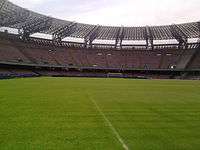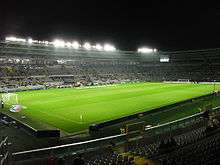UEFA Euro 1980
| Italia 1980 Campionato Europeo di Calcio 1980 (Italian) | |
|---|---|
|
UEFA Euro 1980 official logo | |
| Tournament details | |
| Host country | Italy |
| Dates | 11 – 22 June |
| Teams | 8 |
| Venue(s) | 4 (in 4 host cities) |
| Final positions | |
| Champions |
|
| Runners-up |
|
| Third place |
|
| Fourth place |
|
| Tournament statistics | |
| Matches played | 14 |
| Goals scored | 27 (1.93 per match) |
| Attendance | 345,463 (24,676 per match) |
| Top scorer(s) |
|
The 1980 UEFA European Football Championship final tournament was held in Italy. This was the sixth European Football Championship, which is held every four years and endorsed by UEFA.[1] With eight teams competing, the final tournament took place between 11 and 22 June 1980. Previously, the final tournament of the European Championships was played among four teams. Champions were West Germany who won their second title. It was the last Euro tournament with a competition for third place.
Overview

This was the first European Championship in which eight teams, rather than four, contested the final tournament.[2] On 17 October 1977 UEFA announced that England, Greece, Italy, Netherlands, Switzerland and West Germany had expressed interest in hosting this event.[3] On 19 October UEFA's Organizing Committee decided to assign the hosting to England or Italy (expressing its favour to the latter, the former having already hosted the FIFA World Cup just 11 years earlier), and on 12 November the Organizing Committee and the Executive Committee announced that Italy had been chosen unanimously. Seven countries had to qualify for the final tournament, and the draw for the qualifying round took place in Rome on 30 November 1977. Also for the first time, the hosts, in this case Italy, qualified automatically for the finals.
Because of the expanded format, the final tournament went through some changes as well. Two groups of four teams each were created; each team would play all others within their group. The winners of the groups would go straight to the final (there were no semi-finals), while the runners-up disputed the third place match.
The tournament generally failed to draw much enthusiasm from spectators and TV viewers. Attendance was generally poor except for matches involving the Italian team. The defensive style of play of many teams led to a succession of dull matches. Hooliganism, already a rising problem in the 1970s, made headlines again at the first-round match between England and Belgium where riot police had to use tear gas, causing the match to be held up for five minutes in the first half.[4] The only bright spots were the emergence of a new generation of talented German stars such as Bernd Schuster, Hans-Peter Briegel, Horst Hrubesch, Hansi Müller and Karl-Heinz Rummenigge, and the inspirational performance of Belgium (around rising stars such as Jan Ceulemans, Eric Gerets, Jean-Marie Pfaff, and Erwin Vandenbergh) who reached the final, only losing to West Germany (2–1) by a Hrubesch goal two minutes before time.[5]
Qualification
The following teams participated in the final tournament:
.svg.png) Belgium
Belgium Czechoslovakia
Czechoslovakia England
England Greece (first appearance)
Greece (first appearance) Italy (automatically qualified as hosts)
Italy (automatically qualified as hosts) Netherlands
Netherlands.svg.png) Spain
Spain West Germany
West Germany
Venues
| Rome | Milan |
|---|---|
| Stadio Olimpico | Giuseppe Meazza |
| Capacity: 66,341 | Capacity: 83,141 |
| |
 |
| Naples | Turin |
| Stadio San Paolo | Stadio Comunale |
| Capacity: 81,101 | Capacity: 71,180 |
 |
 |
Match officials
| Referee |
|---|
| Erich Linemayr (AUT) |
| Adolf Prokop (GDR) |
| Patrick Partridge (ENG) |
| Robert Wurtz (FRA) |
| Heinz Aldinger (FRG) |
| Károly Palotai (HUN) |
| Alberto Michelotti (ITA) |
| Charles Corver (NED) |
| António Garrido (POR) |
| Nicolae Rainea (ROU) |
| Brian McGinlay (SCO) |
| Hilmi Ok (TUR) |
Results

Group stage
Group 1
| Team | Pld | W | D | L | GF | GA | GD | Pts |
|---|---|---|---|---|---|---|---|---|
| 3 | 2 | 1 | 0 | 4 | 2 | +2 | 5 | |
| 3 | 1 | 1 | 1 | 4 | 3 | +1 | 3 | |
| 3 | 1 | 1 | 1 | 4 | 4 | 0 | 3 | |
| 3 | 0 | 1 | 2 | 1 | 4 | −3 | 1 |
14 June 1980 17:45 |
| West Germany |
3–2 | |
|---|---|---|
| Allofs |
Report | Rep van de Kerkhof |
Group 2
| Team | Pld | W | D | L | GF | GA | GD | Pts |
|---|---|---|---|---|---|---|---|---|
| 3 | 1 | 2 | 0 | 3 | 2 | +1 | 4 | |
| 3 | 1 | 2 | 0 | 1 | 0 | +1 | 4 | |
| 3 | 1 | 1 | 1 | 3 | 3 | 0 | 3 | |
| 3 | 0 | 1 | 2 | 2 | 4 | −2 | 1 |
Third place play-off
21 June 1980 20:30 |
Final
Statistics
- Fastest goal: 6 minutes – Antonin Panenka (Czechoslovakia vs Greece)
Goalscorers
With three goals, Klaus Allofs was the top scorer in the tournament. In total, 27 goals were scored by 22 different players in 14 games for an average of 1.93 goals per game. None of the goals are credited as own goal.
|
Awards
- UEFA Team of the Tournament[6]
| Goalkeeper | Defenders | Midfielders | Forwards |
| |
|
|
|
| |
|
| |
| |
|
||
| |
|
References
- ↑ "BBC SPORT | Football | Euro 2004 | History | Italy 1980". BBC News. 17 May 2004. Retrieved 17 June 2012.
- ↑ "1980 at a glance". uefa.com. 1 July 2011. Retrieved 27 April 2016.
- ↑ Dietrich Schulze-Marmeling: Die Geschichte der Fußball-Europameisterschaft, Verlag Die Werkstatt,ISBN 978-3-89533-553-2
- ↑ Daniel Ruiz (14 June 2016). "Squad rotation, tear gas and a bucketload of medals: How England flopped at Euro 80". FourFourTwo.com. Retrieved 24 June 2016.
- ↑ Higginson, Marc (12 May 2012). "BBC Sport - Euro 1980: How Belgium defied the odds to reach final". Bbc.co.uk. Retrieved 17 June 2012.
- ↑ "1980 team of the tournament". Union of European Football Associations. Retrieved 2 January 2015.
External links
| Wikimedia Commons has media related to UEFA Euro 1980. |


